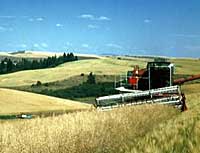Early this summer, long before the word “drought” was mentioned in the media, our household of farmers was ready to strangle the weather forecasters. “A gorgeous sunny day coming up,” they warble. “Another beeyootiful weekend!” To us that means a day of blistering sun, a beeyootiful weekend of irrigating.
“City folk!” we mutter, as the forecasters burble on about sun and we pray for rain. “They have no idea where their food comes from!”

Photo by Oak Ridge National Lab, NREL/PIX.
We are only killing the messenger, and we know it. But we have to get mad at someone, so we pick the forecasters, especially Aarnooldd, the mechanized voice of the National Weather Service. Patiently, 24 hours a day, Aarnooldd drones weather information on the little dedicated weather radio in our kitchen. Even in normal years we live and work by those broadcasts. In a drought year, as the ponds sink and our mood darkens, we tune in several times a day, talk back to Aarnooldd, make black jokes about him, yell at him.
Aarnooldd’s computer-simulated accent makes him sound like a drunk Scandinavian. Pacing around the kitchen, sick of clouds that hover overhead and never release a drop, we imitate him bitterly. “For the Connnecticutt Vaalley there is a seventty perrceent chance of raain except in Plaainfieldd, New Hampshiire, wheere the chance of raain is zerroo.” “Scatttered thunderstorrms expectted in alll areaas exceptt Plaainfieldd, New Hampshiirre.”
In town, drought may be a nuisance; you can’t wash your car or water your lawn. In the country, your livelihood and food supply and consciousness are intertwined with the land, and drought is sheer agony. Months and months of agony, as clouds roll in, thunderstorms play around us, and nothing falls from the sky.
When I’m not blaming Aarnooldd, I blame those clouds. Nowadays I ignore them, cut them cold, snub them with cynical anger. They’re not going to get my hopes up any more. Earlier I would coax them, as if they were a reluctant milk cow. “Come on, let down,” I’d plead. “You’ve got lots of water up there, and we need it so badly down here. Let go!”
They do not let go. At best they spit a short, contemptuous dribble, not even enough to wet the soil under the trees. Our last rain big enough to reach the aquifers occurred on May 20. Even before that it was a dry spring. Every day we had to water the tiny, vulnerable seedlings. But the soil in the hayfields was still soaked from the winter meltoff, so the annual miracle of spring grass unfolded ahead of schedule, warmed by day after lengthening day of sun.
By June the sun wasn’t just warm, it was searing, great for making hay, but once the bales were hauled off the field, nothing grew back. The garden seedlings had sunk deep roots, but we still had to water them, because the deep soil was dry. Aarnooldd’s predictions of thirtty percent, fiftty percent, seventty percent chance of rain were driving us crazy.
In early July the pastures went brown. Gritting our teeth, we began to feed out the first cut of hay, thinking if we could just get one soaker, the fields would recover, and we might squeak out a second cut to get us through the winter. The ponds and brooks were lower than we’d ever seen. The trout died. Our overworked irrigation pump died. A violent storm came through, knocked down trees, and the power died, but all that sound and fury dropped only a quarter inch of rain.
The electricity outage meant we had to haul buckets of water from the depleted brook, but that gave the well a chance to recharge. We had been using it to water cows, horses, chickens, people, gardens. The water had turned cloudy and brown. I started catching drainwater from the sinks and dumping it on the flowers, for which we couldn’t spare irrigation water. We are practicing triage, watering only the crops that actively wilt, never watering anything really enough. The July raspberries were shriveled. The sweet corn rolled up its parched leaves and didn’t form ears.
It’s hard to express a pain like this, one that unfolds so slowly, one that keeps you riding rollercoasters of dashed hope. By now I’ve not only given up hope, I’m beginning to dredge up my darkest thoughts and to look around for something really worth blaming, someone to pound with the pent-up anguish I’ve been suppressing this whole long, hot summer.
My darkest thoughts whisper to me that this isn’t a random bad year; it’s a portent of climate to come. I look back through 27 years of farm records and see a trend of hotter, drier growing seasons. If this is global warming, it will not only go on like this, it will get worse. I couldn’t stand that. Watching a farm dry up is like watching a loved one die in extended agony. I can’t stand it. It would be better to move to the city and be heedless, enjoying the sunny days until the food supply stops.
I’d like to scream at folks driving sports utility vehicles and motorboats and jet skis. “Cut that out! Zooming around in the sun! Changing the climate of a whole planet, just for vanity and pleasure! You’d never do that, if you’d just consider where your food comes from!” I gleefully imagine chaining up the corporate members of the Global Climate Coalition — the public relations group that spends over a billion dollars a year blocking action on climate — chaining them in the hot sun with no water in sight.
But screaming and punishing aren’t likely to change anyone or anything. I’m afraid the pain of the farmers won’t change anyone either. I don’t know what ever will, unless it’s consideration of where our food and water and very lives come from.


